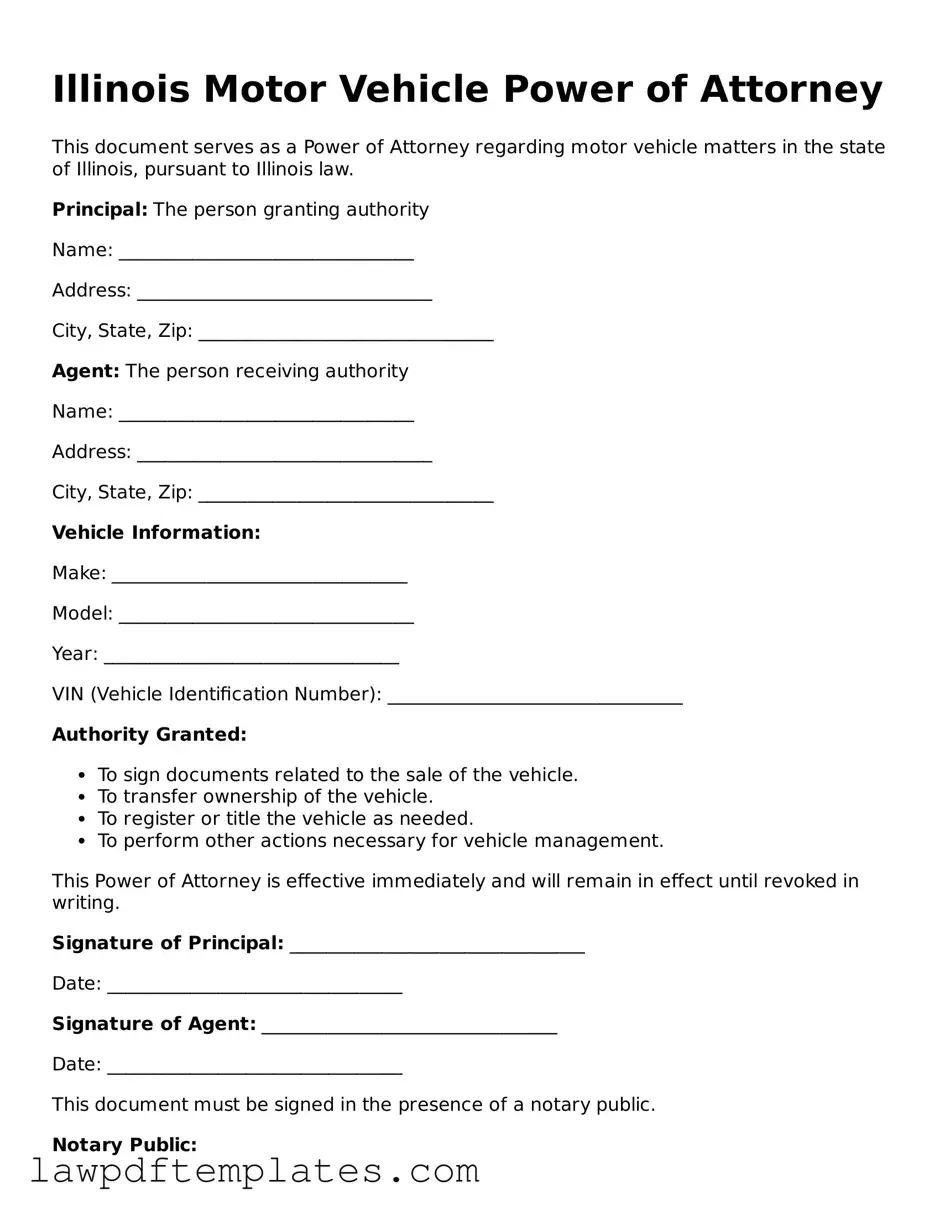Free Motor Vehicle Power of Attorney Template for the State of Illinois
Form Breakdown
| Fact Name | Details |
|---|---|
| Purpose | The Illinois Motor Vehicle Power of Attorney form allows an individual to designate another person to handle specific vehicle-related transactions on their behalf. |
| Governing Law | This form is governed by the Illinois Vehicle Code, specifically 625 ILCS 5/3-104. |
| Signatory Requirements | The form must be signed by the principal (the person granting the power) in the presence of a notary public. |
| Types of Transactions | Authorized transactions include transferring ownership, obtaining a duplicate title, and registering a vehicle. |
| Validity Period | The power of attorney remains valid until revoked by the principal or until the principal's death. |
| Revocation Process | The principal can revoke the power of attorney at any time by providing written notice to the attorney-in-fact. |
| Attorney-in-Fact | The designated person, known as the attorney-in-fact, must be at least 18 years old and can be a family member or friend. |
| Notarization Requirement | Notarization is essential for the form to be legally binding and accepted by the Illinois Secretary of State. |
| Use for Multiple Vehicles | The form can be used for multiple vehicles by listing each vehicle's details within the document. |
| Availability | The Illinois Motor Vehicle Power of Attorney form is available through the Illinois Secretary of State's website and various legal resources. |
Sample - Illinois Motor Vehicle Power of Attorney Form
Illinois Motor Vehicle Power of Attorney
This document serves as a Power of Attorney regarding motor vehicle matters in the state of Illinois, pursuant to Illinois law.
Principal: The person granting authority
Name: ________________________________
Address: ________________________________
City, State, Zip: ________________________________
Agent: The person receiving authority
Name: ________________________________
Address: ________________________________
City, State, Zip: ________________________________
Vehicle Information:
Make: ________________________________
Model: ________________________________
Year: ________________________________
VIN (Vehicle Identification Number): ________________________________
Authority Granted:
- To sign documents related to the sale of the vehicle.
- To transfer ownership of the vehicle.
- To register or title the vehicle as needed.
- To perform other actions necessary for vehicle management.
This Power of Attorney is effective immediately and will remain in effect until revoked in writing.
Signature of Principal: ________________________________
Date: ________________________________
Signature of Agent: ________________________________
Date: ________________________________
This document must be signed in the presence of a notary public.
Notary Public:
State of Illinois
County of ________________________________
Subscribed and sworn to before me this ___ day of __________, 20__.
Notary Signature: ________________________________
My Commission Expires: ________________________________
Common mistakes
Filling out the Illinois Motor Vehicle Power of Attorney form can seem straightforward, but many people make common mistakes that can lead to delays or complications. One frequent error is failing to provide the correct vehicle information. This includes the vehicle identification number (VIN), make, model, and year. Omitting or incorrectly entering this information can render the document invalid, causing unnecessary frustration.
Another mistake often made is neglecting to sign the form. While it may seem obvious, some individuals forget to include their signature, or they may sign in the wrong place. The absence of a signature means the document cannot be processed, and the authority granted is not recognized.
People also frequently overlook the need for a witness or notary. In Illinois, certain situations require the Power of Attorney form to be notarized or witnessed to be legally binding. Skipping this step can lead to issues when trying to use the document, as it may not hold up under scrutiny.
Additionally, individuals sometimes fail to specify the powers being granted. The form allows for various powers to be assigned, such as the ability to sell, transfer, or register a vehicle. Not clearly outlining these powers can lead to confusion and limit the agent's ability to act on behalf of the principal.
Another common oversight is not updating the form when circumstances change. If a person moves, sells a vehicle, or if the designated agent is no longer able to fulfill their role, the form should be revised. Failing to do so can lead to complications, especially if the agent attempts to act under outdated authority.
Finally, some people forget to provide their contact information. Including a phone number and address is important for any follow-up or clarification needed by the authorities or the designated agent. Without this information, communication can break down, leading to further complications in the process.
Discover More Motor Vehicle Power of Attorney Templates for Specific States
How to Get Power of Attorney Florida - Assigning power of attorney for your vehicle saves time when dealing with DMV or other agencies.
For more information on the USCIS I-864 form and to access helpful resources, visit the PDF Documents Hub, which can guide you through the process and provide valuable insights.
Title Transfer Nj - This form ensures your vehicle interests are protected when you can’t be present.
